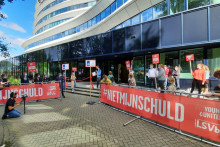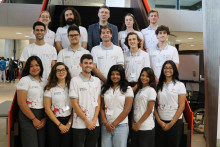Originally from Friesland, and with Dutch as her first language, it is not an overstatement to say she feels so comfortable with English that it is her first love among languages.
As UT internationalises, her plate is full, as van Harten is solely responsible for coordinating all the activities concerning English and Dutch language courses at UT. This task is challenging, since as of now, only two colleagues work part-time assisting her. Van Harten is still very optimistic about the future, as reinforcements in the form of more staff are expected soon. The webpage (www.utwente.nl/tcp) is also up and running, and lists a comprehensive set of programs. After a decidedly slow start in establishing a centralised entity for language-related activities (the last university in the Netherlands to do so), the UT is now moving through the gears. More funding, more staff, and a bigger course-matrix symbolise this drive.
Van Harten confidently states that there is no other organisation that caters to the needs of the whole cross-section of UT students and staff. The TCP has a major role in internationalisation, as this is nearly synonymous with `everyone should speak English'. The benefits of having a regulated body for language coordination are numerous. By organising Dutch language courses for the non-Dutch speaking members of UT and English language courses for anyone who is interested, the TCP facilitates the integration of all the members of UT and enables students and staff to produce grammatically clear thesis reports and publications, among other functions. Van Harten adds that the TCP is looking into new ways to cater to the UT's language requirements in all spheres, through active collaborations with the language centres of other Dutch universities as well as with an organisation providing a formal platform for Dutch language learning.
All these initiatives notwithstanding, the popularity of the Dutch language among foreign students and AIOs is low. This is probably due to the fact that Dutch is not a major language of the world and may not be of great use if and when they go elsewhere to pursue their careers. Asked to comment, van Harten says that it is not the duty of the TCP to motivate people; its duty is to serve the motivated people. According to her, the Dutch people are also partly responsible for the lack of motivation among foreign students and AIOs, as they do not give them much of an opportunity to practise Dutch, and have no reservations using English. For those who want to learn Dutch or other languages in an informal atmosphere, she recommends `Student Mobility In Twente' (SMIT), which has language projects for attracting participants from various linguistic backgrounds and encourages them to learn each others' languages (www.smit.utwente.nl).
Van Harten sums up TCP's existence: `We are here to serve. TCP is not only for non-Dutch members of the UT, but also for natives. Many people, Dutch or otherwise, think that their English is perfect, but there is always room for improvement. The TCP presents an opportunity to hone English language proficiency”. She is confident that TCP will be sustained by attracting motivated individuals to sign-up for the burgeoning number of courses, and by promotional activities. Let's all extend our support to the TCP in transcending the language barrier, thereby paving way for better on and off-campus integration.

The TCP Trio: Sabien van Harten (sitting, r) with her colleagues Lianne Peper (sitting, l) and Phing Choo.







